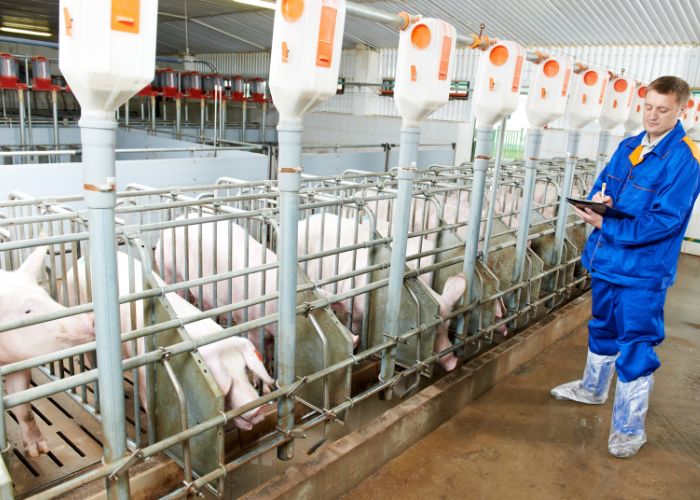MADRID – Spanish environmental groups have been fighting macro farms for years. Intensive industrial livestock farming with thousands of animals in a small area has a devastating impact on the environment. However, a royal decree should put an end to that.
Because macro farms contribute to climate change, cause greenhouse gas emissions and pollute water layers, they must be limited. In addition, they are regularly accused of and caught in animal cruelty.
With the royal decree adopted at the end of December, the government wants to put an end to these livestock farms by putting limits on the number of animals per farm to approximately 725 dairy cows or 850 head of cattle. Environmentalists think it is positive for the environment, water, land and animals, but still see it as insufficient.
Largest livestock farm in Europe
However, the new decree means a definitive end for the planned macro farm of Valle de Odieta in Noviercas (Soria). 23,520 cows would be housed there. It would have been the largest farm in Europe and one of the largest in the world.
Furthermore, the new legislation also prohibits the expansion of existing farms. This frustrates, for example, the request of the same company to expand the macro farm in Caparroso (Navarra). With the original request, that livestock farm would be twelve times larger than the new law allows.
Greenpeace: “Text still falls short”
Greenpeace believes that the text is still inadequate: “850 head of cattle are still too many and the environmental impact is still huge.” That is why the organisation has submitted a petition in which they advocate a maximum capacity of 180 animals. Valle de Odieta has announced that it will appeal to the Supreme Court against the royal decision.
Essential to halve herd size
It is essential to reduce livestock by 50% by 2030, according to Greenpeace. Only then can we tackle climate change, water pollution, emissions and animal suffering. Other European countries have already passed more ambitious legislation, such as the Netherlands planning to cut emissions by up to 70%, meaning one in three farms must close.
Also read: The limits in sight for Spanish macro farms
Germany, the largest exporter of pigs within the EU, will no longer send live animals outside the EU this summer. Consequently, this will reduce the number of farms and their size.
Another alternative is the policy of the Flemish government in Belgium, which compensates pig farmers who choose to reduce the capacity of their farms or close them completely.
Take action against the macro farm model
According to Greenpeace, it is essential to follow the example of these countries and take action against the macro-farm model. This model is based on feeding and fattening animals quickly to maximise profits. This model just keeps growing. Since the 1960s, the number of cows in Spain has doubled and the number of pigs has increased fivefold, according to Greenpeace.
All this has a major impact on our planet. Currently, 40% of the groundwater, our future reserves, is in poor condition due to overexploitation and pollution from intensive livestock farming and agriculture, among other things, emphasises Greenpeace. Macro farms turn fertile farmland into dumping grounds because of the enormous amount of manure they produce. While manure can be good for the soil, it becomes toxic in large amounts.
Climate change
The agricultural sector is currently the third largest contributor to climate change in Spain, with 65% of emissions coming from livestock farming. In terms of methane emissions, the agricultural sector is responsible for 63% of the country’s total emissions, 98% of which are caused by livestock farming, criticises Greenpeace.
Macro farms are the pinnacle of industrial livestock farming. They require the use of fossil fuels to fertilise, collect and transport raw materials. They generate huge amounts of waste that cannot be processed or broken down by the ecosystem and that permeates groundwater and surface water. In addition, intensive livestock farming consumes excessive amounts of animal feed, for which large areas of land must be deforested to grow soybeans, for example.
Greenpeace therefore calls for action against the macro farm model. Reducing livestock numbers and moving to more sustainable forms of farming are crucial steps to reduce the negative impact on the environment and ensure a healthier future for our planet.
Also read: Water pollution increased by fifty per cent in four years


